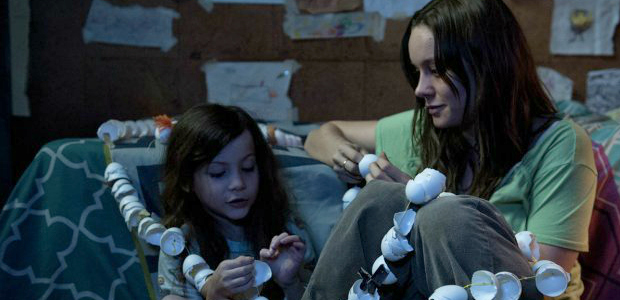I walked into a screening of Room knowing very little about the story. In fact, I believed — no doubt through some flawed game of telephone a few months back — that it was about a mother and son who never left their room due to some post-apocalyptic conditions, and maybe there was some sort of image projector used to simulate the outside world. For the record, that’s not what it’s about. If it wasn’t for the overwhelming buzz around the film and Brie Larson’s performance, I might’ve even waited a longer time to see it. This blissful ignorance was a gift bestowed upon me by circumstance, and it’s one that made the experience of watching Room with fresh eyes that much more powerful and devastatingly human.
It’s a gift that I will try now to pass along to you.
Plato’s “Allegory of the Cave” is given a much more emotional context in this story directed by Lenny Abrahamson (from Frank, starring Michael Fassbender) and written by Emma Donoghue, who also penned the best-selling novel on which the film is based. It’s the story of Ma (Larson) and her son, Jack (Jacob Tremblay). Like this little boy, who just turned five, we know nothing of this world in which they live. We don’t know why they live in such a confined room. We don’t know why they can’t go outside. We just know that they are restricted to this space, which Ma has named “Room.” She’s taken every opportunity to make Room as comforting and nurturing and normal as possible. “Space” is what lies outside the bounds of Room, and the only knowledge Jack has of what’s out in Space is through TV. He often compares words to the moving images he sees on TV, such as a backyard “like in TV.”
It’s a rare gift to see the world through a child’s eyes, and Jack is our window into Room. We are privy to his thoughts, and TV, and the stories Ma tells him offer the principals by which he decides what is real and what is not. The ocean, for instance, is much too big to fit in Room and, he assumes, in Space, so therefore it can’t be real. It’s possible, though, that dogs are real, however he only has one in his imagination. He also gathered some information about Space from “Old Nick,” a man who comes into Room every night to see Ma and drop off food and, if it’s Sunday, special treats. But Ma makes Jack stay in Wardrobe when Old Nick visits because “Old Nick is not a friend.”
Now that Jack is 5, however, it’s time for him to understand the world, and Ma decides it’s time for both of them to leave Room. For the purposes of this review — again, keeping things as spoiler-free as possible — they do leave Room, thrusting Jack into the literal and proverbial light. This jarring moment for the child further develops the themes of isolation, reality, and the fierce, unbreakable bond between mother and child in the most attentive, thoughtful, and painfully honest way possible.
Brie Larson turned heads with Short Term 12 a couple years back, but her performance as Ma stretches her to reach for and surpass difficult emotional bounds. We’re at the same distance from her as Jack, but we deeply feel for her plight and for her fight to maintain the well being of her child under these unusual circumstances. When the two emerge from the darkness of Room, we feel for her more. The strength she once forcibly exuded for the sake of Jack is gone when she realizes she’s not alone anymore, and she no longer has to be as strong. In that dark time, she’s faced with the haunting question of whether or not she did the best she could to help her child. Larson’s transformation of protective mother to a young mother crumbling under the horrors of reality is subtle but expertly handled.
In one scene that beautifully and tearfully captures the delicacy in which Room approaches the material, Ma tells Jack that she’s not a great Ma. He replies, “But you are Ma.”
When you hear 8-year-old Jacob Tremblay deliver lines of dialogue like this, it’s difficult to discern whether he’s acting or genuinely reacting to the situations presented to him, as any actual 8-year-old would. When Ma is giving an interview to a primetime network journalist about her time in Room, she’s asked whether she would one day tell Jack about his father. Similarly, I wonder whether Tremblay knows fully well about the subject matter he’s tackling, and how he’ll look back on his performance as an adult.
Not only is Room one of the best films of the year — that I’ve seen so far — it’s also one of the most moving. Few works have incited heart-pounding anxiety, moved me to tears, and evoked the same level of hope within a confined time frame, and Room did so with such elegance and care that a mother would give to her child. Whether or not the Academy gives this film as much attention as it deserves does not matter, because even without Oscar glory, it remains a triumph of the human experience.
Y2K Checked All The Boxes For This '90s Kid, But I Need To Talk Out One Issue I Had With The A24 Horror-Comedy
Finn Wolfhard Had An 'Emotional Hangover' After His Last Day On Stranger Things, And I'm Having My Own After Seeing His Comments On It
As A Star Wars Horror Project Is Reportedly In The Works, I Have An Idea That Would Make For A Chilling Movie











